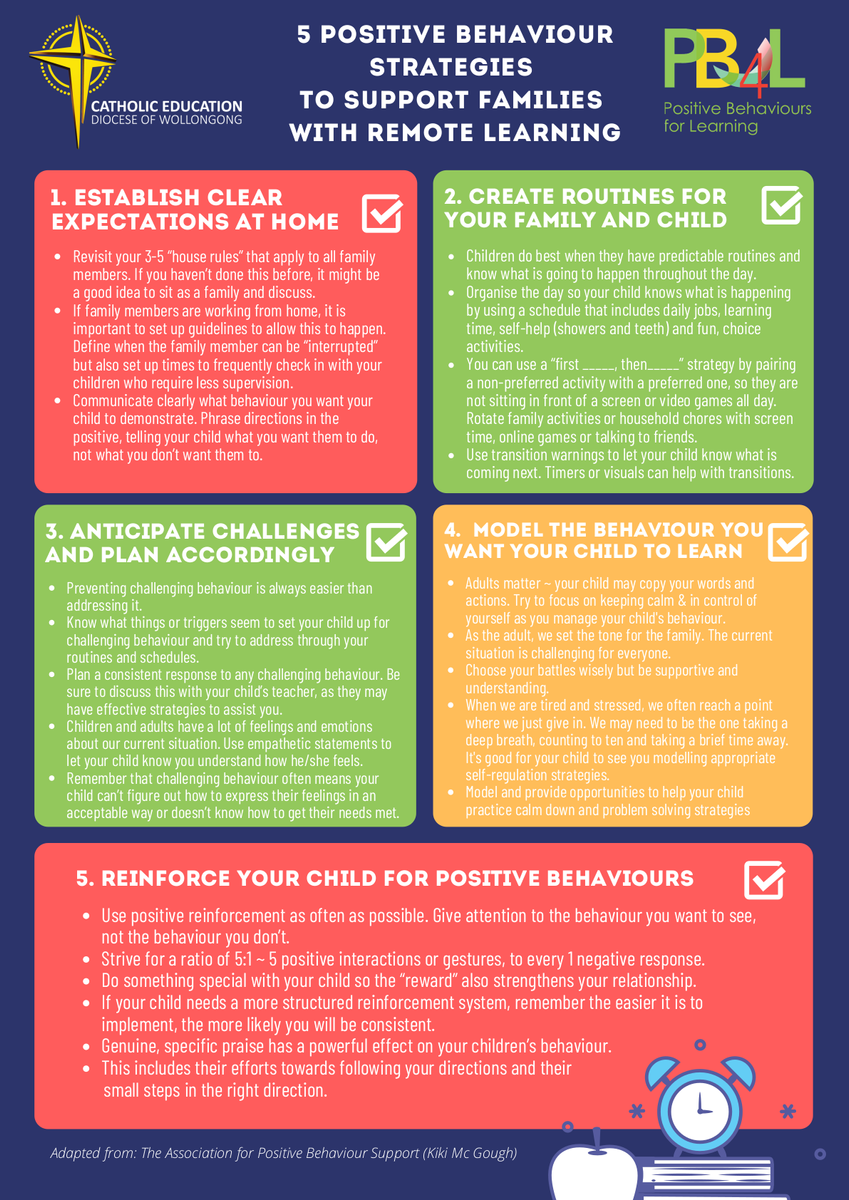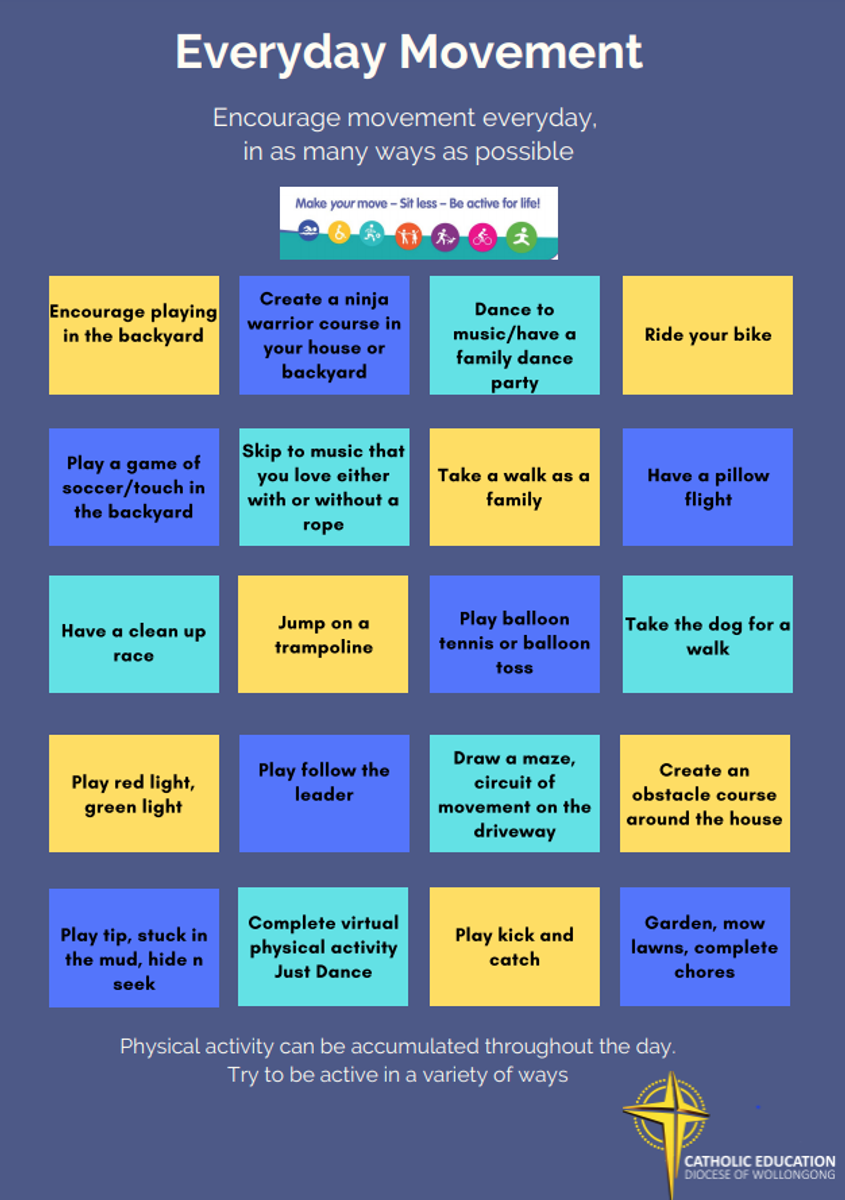
Keeping Focused, Interested, balanced!
Is it time for a
learning RESET
at home?
Try these tips to keep children focused, interested, and balanced while learning from home.
Ensure the learning space at home remains in place.
- Getting the space organised each afternoon for the next day will help them be ready to learn each morning.
Keep your routines going.
- Be flexible with the Weekly Learning schedule and make it work for your family. Change the order of learning tasks if needed and support your child to get the work done when it works for you.
- Little children need more structure, so make sure to let them know what to expect. Use the Learning Schedule to help plan out the day.
- Have them follow a routine as if they're going to school (getting dressed, brushing teeth, etc.) instead of lying in bed in their pyjamas, which could lead to less learning.
- Movement and brain breaks are really important, especially for children with learning and attention difficulties, so make sure to build those in and break work into smaller pieces if needed.
- Plan to take a break with your children, have fun together.
Now is the time to review expectations.
- Go over the PB4L expectations- this is what the school expects around online learning.
- Set some expectations of your own as well. When can your child expect to spend time with you? When should they avoid interrupting you? What can they do in their downtime? Come up with a list of "must-dos" and "may-dos" together to cover the essentials and activities of choice.
Zoom meetings with teachers
- Make sure you or your child set an alarm so that they don't forget the very important Zoom meetings with teachers and their class.
Staying Focused. Keep them close.
- When it's hard for your child to focus, try to keep them close. Consider setting up nonverbal or one-word cues to help get them back on track.
- Give plenty of praise for staying focused.
Encourage self-regulation.
- Talk to your child about the connection between bodies and brains and what happens in their bodies when they feel frustrated, excited, or sad. This awareness helps kids recognise and manage their emotions.
Encouraging Ownership and Effort
Follow your child’s interests and get input.
- If there are gaps in your child's school day, remember that whatever your child is into can motivate them and provide something to look forward to when they complete their learning for the day.
- When deciding how to structure the day, ask your child what they prefer. Try to incorporate their choices into the plan. For instance, if Mathematics is the hardest subject for your child, would they rather do it first or last? Why?
- Communicate with your child's teacher if needed.
- Talk about your day, including the positives, challenges, and kindnesses.
Display work.
- Let children hang up their drawings, writing, or other work in your home. It shows them you're proud of their work and helps them value their learning.
- Even older children like it when you show pride in their work by bragging about their efforts and showing off their work.
Give detailed praise.
- Instead of saying "good job," try giving specific details about your child's work. If they tried hard, let them know you noticed. Have they made progress? Used a new skill or knowledge? In what ways are their efforts kind, clever, beautiful, or insightful?
- Also, encourage a growth mindset, which means reminding children that it's not about being good or bad at something, but working toward getting better at it.
Managing Motivation
Start from strengths.
- Remind your child of what they are doing well and are good at.
Presentation is everything.
- How you present an activity makes a huge difference in how a child feels about it. For little ones, whenever you can, frame tasks as games to make them more fun. Need to sort the laundry? Challenge your child to a throwing contest of tossing clothes into the right pile. Or, let them use pieces of cereal as manipulatives for Mathematics problems and eat them when they've finished a problem.
- Sometimes what seems to be a "bad attitude" is really masking insecurity, boredom, or anxiety. They're often hoping you will help them through it, even when it seems just the opposite. Staying calm, not taking things personally, and maintaining a sense of humour can go a long way.
Use natural consequences.
- While it might be tempting to "reward" your child with screen use, that can set children up to see screens as a coveted commodity. Instead, you can frame it as a timing issue: "We have three hours in the evening, so if you put a strong effort into your work and finish, you'll have time to play your video game."
- If motivation is hard to come by, you can incentivise effort and progress in a way that makes sense. Come up with ideas with your child, set benchmarks, and praise the process along the way.
Making Room for Well-Being
Be a good friend to yourself.
- If your child gets caught up saying negative things about themselves, encourage self-kindness by asking them what they would say to a friend in the same situation.
- The same goes for you: We often beat ourselves up as parents, but what would a good friend say to you? What would you say to your friend?
- Try creating a gratitude list together to give you a fresh perspective and focus.
Get help when you need it.
- You won't always know how to help your child. Think about who could help fill in the gaps, look to family, friends, teachers, and others for help. Sometimes having another adult talk to your child removes the tricky parent/child home learning battle dynamic and lets you go back to just being a parent.
- Communicate with the school about how things are going, leading with positives first. Everyone's doing their best, AND it's important for teachers to know what's working and not working for your child so they can get the help they need.
Use movement and humor.
- Sometimes we just need to move our bodies. Physical activity can lift our spirits and get our minds refreshed for learning. Try a lunchtime block walk or a 5-minute dance party to help everyone reset and bring new energy to the day.
- Finding the funny right now is helpful on every front, including learning and well-being. Be silly, make wacky connections, come up with crazy answers so your child corrects you -- whatever works!
(Adapted from Commonsense Education)
Wellbeing Resources from the Week 2 Newsletter
Staying Mentally Healthy
- Work with your child to use the wellbeing resources provided by teachers in the weekly Remote Learning Schedules.
- Schedule daily exercise with your child/ren
- Plan and moderate time on electronic devices
- Set up a sleep routine
- Plan healthy meals and snacks for the week
- Plan some quiet time to relax the mind- perhaps use mediation, or listen to calming music.
- Try some breathing exercises
- Check on your child's wellbeing and if concerned use the Beyond Blue Child Mental Health Check
Explaining COVID-19 to Children
What Can Parents Do To Stay Mentally Healthy?
While many of you will have been putting a great deal of thought into how to help your children cope during this pandemic and remote learning, it’s important that you also put some thought into how to maintain your own wellbeing.
Parents/carers may have a range of different emotional reactions, including feeling overwhelmed, apathetic, worried or irritable.
Although you might be tempted to go into overdrive to minimise the impact on your kids, you are not immune to the stress either. Remember that taking care of your own wellbeing is essential.
Below are four things you can do for your own wellbeing:
- Be gentle with yourself: In the world of parenting, there is a drive to be the best you can be, and to be everything to everyone. Your kids don’t need you to be the perfect parent/carer. They need you to be good enough and to help them feel safe and supported. For this to happen, they need you to be OK. Try to create more realistic and achievable expectations to reduce the pressure.
- Take breaks for self-care: Make sure you take some breaks to do the things that will help you feel less stressed. If you have someone to watch the kids, take a walk by yourself and enjoy the break. Try to find some time each day to take care of yourself, even if it’s just five minutes.
- Stay connected: While it’s important to make time to have fun and connect as a family, make sure you create time for your own social connections. Vent. Laugh. Share ideas about coping and compromising. Be there to support each other.
- Be mindful of how you are thinking about the situation – take it seriously but keep your response in perspective: Stay informed from reliable sources but remember that this will end. It might not feel like it some days, but it won’t be like this forever.
In the video below, Dr Carly Johnco from the Centre for Emotional Health and Department of Psychology at Macquarie University talks to parents and carers about how to look after their own mental health during the COVID-19 pandemic.
How Parents can Keep Calm and Manage Stress
Way to reduce Stress- Beyond Blue
Tips for keeping calm and managing stress- download the PDF below
Ideas for Positively Managing your Children's Behaviour
Getting Children to listen
Positive Approaches to Guiding Children's Behaviour
How Can I Get Help if My Child is Not Coping?
Contact the school
Contact your GP
CatholicCare Wollongong Phone 4254 9395
LIFELINE : 13 11 14
KIDS HELPLINE: 1800 55 1800 kidshelpline.com.au
Download the PDF below
How Do I Know If My Child Is Not Coping?
Parent Guides to Anxiety and Depression





